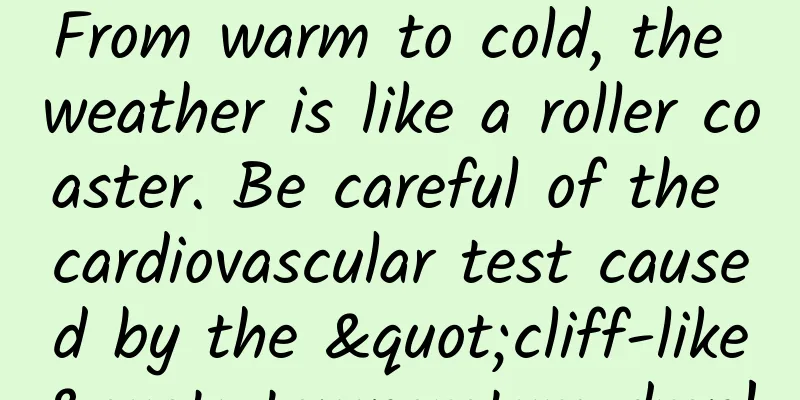From warm to cold, the weather is like a roller coaster. Be careful of the cardiovascular test caused by the "cliff-like" temperature drop!

|
The weather lately has been a bit confusing. I remember when I was a kid, after the beginning of winter, we had to prepare cotton-padded jackets, scarves and gloves. But this year, it’s almost the end of the year, and the temperature outside is still spring. Especially friends in the north, they all lamented: they are still wearing thin coats to go shopping in the middle of winter! But meteorological experts remind us that this abnormal warmth could end at any time. The temperature could drop off a cliff like a roller coaster, and suddenly dive down. The most worrying thing about this weather change is our cardiovascular health. 1. Why should we worry? Imagine that we are soaking in a warm bath, and suddenly someone opens the window, and the cold wind rushes in. What is your first reaction? That's right, you shudder and quickly curl up. Our blood vessels are the same. When we encounter a big temperature difference, we will also "shiver" and shrink quickly. For young people, this kind of contraction may just be a matter of feeling a little cold and putting on more clothes. But for others, it may not be that simple. It's like a rubber band. It's fine if you pull it normally, but if you pull it suddenly and hard, it will often cause problems. 2. The body’s whispers Sometimes our bodies give us little signals, like a tap on the shoulder saying, "Hey, pay attention!" For example: My temple suddenly started throbbing, as if someone was beating a small drum inside. Severe headache, especially on one side My chest feels stuffy, as if there is a stone pressing on it. Hands and feet suddenly become unresponsive, numb or tingling When I was sleeping at night, I suddenly felt my arms swelling, as if the blood had stopped. These are actually your body's way of saying "hello" to you. Don't be embarrassed, you need to stop and take good care of yourself at this time. 3. How to protect yourself? Let’s listen to some common experiences 1. Dress with care I remember my grandma often said: "Wearing clothes is like making dumplings, wrapping them layer by layer." Now I think about it, it really makes scientific sense. Instead of wearing a thick cotton-padded jacket, it is better to wrap a layer of thermal underwear inside, a thin woolen sweater outside, and a coat like making dumplings. This will not only keep you warm, but you can also adjust it in time according to temperature changes. What's the point? Take good care of your neck and chest. Just like keeping doors and windows tightly closed, these areas are where you keep warm, but they are also the "biggest" areas for air leakage. 2. Going out requires knowledge In the early morning and evening, when the temperature difference is the greatest, try not to go out to avoid the sudden change of temperature. If you have to go out, you must be "fully armed". It's just like swimming. You need to do warm-up exercises before going into the water, and we also need to give our bodies some time to adapt before going out. 3. There are also tips for the temperature at home The room temperature should be kept at around 18-22 degrees, which is the most comfortable temperature. If the temperature fluctuates, it is easy to catch a cold. Just like cooking soup, the heat should be stable. If the heat fluctuates, the soup will not cook well. Especially when sweating or covering up, the hot and cold temperature is the main reason for many children to catch a cold. 3. Exercise at the right time and within your ability In this kind of precipitous drop in temperature, you should not exercise arbitrarily. Especially one or two days before the temperature drops, the intensity of exercise should be appropriately reduced. Just like driving uphill or downhill, you should go slower when going uphill and be more careful when going downhill. 4. Tips on eating and drinking Drink more warm soups and less cold drinks. Eat bananas, nuts, fungus, etc. to supplement potassium and magnesium to make blood vessels more "comfortable". Don't drink too much coffee. Excessive excitement will also make your heart unhappy and you won't be able to sleep at night! 5. Special care for the special you If you have cardiovascular problems, be more careful. Don't stop taking medicine, measure your blood pressure regularly, and go to the hospital if you feel something is wrong. Just like machinery needs regular maintenance, prevention is better than cure. Elderly friends should pay more attention, don't be reluctant to turn on the heating, and wear clothes sparingly. Health is the most important asset. In this kind of weather, it is best to live with your family or keep in touch. 6. What if I really feel unwell? Don't push yourself if: Sudden severe chest pain A bit out of breath I have an unbearable headache. Feeling a bit confused Numbness in the face or hands and feet Don't hesitate at this time, go to the hospital immediately. Just like a fire alarm has already sounded, you need to deal with it quickly. Finally, please remember that caring for your body is not about being squeamish, but about being responsible. After all, your body is your most loyal companion in this life, so you must take good care of it! References 1.Smith, J. et al. (2023). "Climate Change and Cardiovascular Health: A Global Perspective" The Lancet, 401(10375), 367-379. 2.Chen, X. et al. (2023). "Temperature Variability and Cardiovascular Mortality: A Multi-country Study" Nature Climate Change, 13, 61-68. 3.Wang, Y. et al. (2023). "Acute Effects of Temperature Variation on Cardiovascular Events" New England Journal of Medicine, 388(12), 1089-1101. 4.Li, M. et al. (2024). "Prevention Strategies for Climate-Related Cardiovascular Events" Cell, 185(1), 42-57. 5.Zhang, H. et al. (2023). "Climate Adaptation and Public Health: Focus on Cardiovascular Protection" Science, 379(6631), 284-289. |
>>: Does frequent farting mean there is something wrong with your stomach?
Recommend
The benefits of eating brown sugar boiled eggs during menstruation
Most women experience a menstrual period every mo...
What app should I use to take the subway in Chongqing? What should I do if I don’t have cash on the Chongqing Light Rail?
Chongqing is one of the municipalities directly u...
Lower back pain female
For women, if they experience lower back pain, th...
Does pharyngitis affect pregnancy?
Pharyngitis is a relatively common symptom, and m...
Gynecological Gram-negative bacilli
Gram-negative streptococci are one of the key pat...
How long after giving birth can I exercise?
Some women have a good figure before pregnancy, b...
What are the tips for learning to ride an electric bike? How to prevent theft after buying an electric bike?
My neighbor recently bought an electric bike and ...
Can I have acupuncture during pregnancy?
During pregnancy, pregnant women must strengthen ...
How do girls play hard to get?
Most people are familiar with the tactic of playi...
When is the best time to drink mutton soup? How to remove the fishy smell of mutton soup
Mutton is tender and easy to digest. It is high i...
Did Choi Sulli commit suicide due to depression? What did Choi Sulli write in her suicide note?
After Sulli was confirmed dead, everyone was shoc...
How long does the stomach ache last after medical abortion?
Surgical abortion requires the use of tools for c...
Hyperuricemia: 12 things you need to know
The origin of hyperuricemia day "4·20" ...
How to deal with inflammation of female reproductive organs
In daily life, both men and women have reproducti...









